About the research topic
Through advances in artificial intelligence (AI), medical imaging has gained an increasingly important role in precision medicine. AI methods are being used both in radiology (“radiomics”) and pathology (“pathomics”) to develop prediction models that are at the basis of more precise and personalized clinical decision making. While radiomics and pathomics models often have similar goals and contain complementary information, these research fields are largely separated. Moreover, despite major advancements in these fields, implementation in real-world clinical practice remains limited. The aim of the AI for Integrated Diagnostics (AIID) research line is to join forces of radiomics and pathomics to create trustworthy models to aid clinicians in decision making.

In the AIID research line, we focus on pan-cancer oncology models, with soft-tissue tumours as use-case in this specific project. First, we will focus on the development of deep, unimodal radiomics and pathomics methods to learn rich data representations of both modalities on their own. Second, based on these representations, we will develop multimodal machine learning methods that harness the complementary information from radiology and pathology data. Third, we will exploit advances in automated machine learning and pan-cancer meta-learning to translate knowledge across oncological diseases for improved diagnostics and prognostics. Fourth, to facilitate transition to clinical practice of these models, we will develop a reusable framework using the FUTURE-AI guidelines for trustworthy and deployable AI. Additionally, we will establish the required data and processing infrastructure. Due to the multi-faceted nature in terms of modalities and various AI methodologies at the core of this research programme, it spans all facets and multiple research questions of the AIREA-NL agenda.
Funding: This project funded by an AiNed Personal Fellowship Grant, kickstarting the AIID research line.






